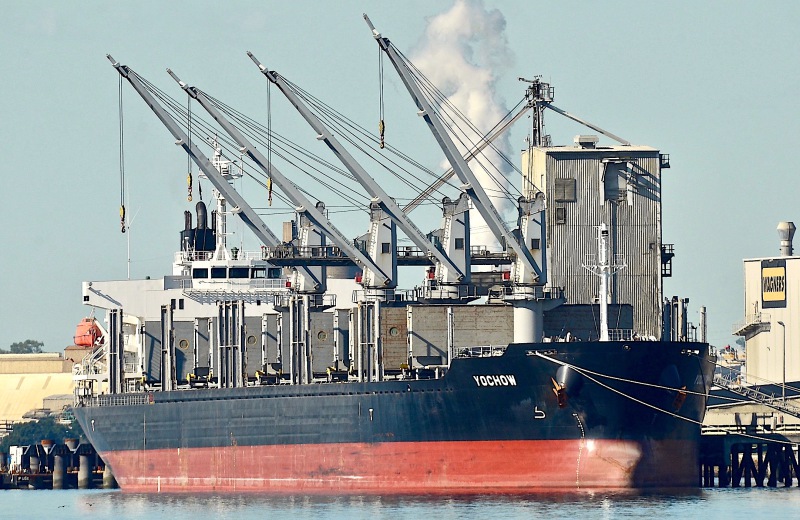The helmsman on a bulk carrier was fatigued and the mate not paying attention to his mistakes when the ship hit a moored barge at a Houston terminal in June 2018, inflicting more than $21 million in damage, the National Transportation Safety Board says in a new report.
There were no injuries or pollution from the accident, which happened in the early morning hours of June 13, 2018 as the 590’x98’, 34,000 dwt Hong-Kong flagged Yochow was inbound in the Houston Ship Channel.
The articulated tug and barge OSG Independence and OSG 243, operated by Overseas Shipping Group, Tampa, Fla., were moored at the TPC Group, Inc. facility on the Sims Bayou Turning Basin. The barge tanks were empty and inerted, awaiting a cargo of methyl tert-butyl ether (MTBE), the gasoline additive.

A diagram shows how the bulk carrier Yochow failed to make a turn in the Houston Ship channel, striking a moored ATB. NTSB image
The t-bone impact amidships holed two tanks on the double-hull barge and the bulker’s bulbous bow, and inflicted extensive structural damage on the terminal, to the tune of $20 million, according to NTSB investigators.
Based on interviews, the investigators report includes a narrative of the Yochow up the channel toward Houston. It portrays a tired helmsman who at times made turns opposite to the Houston ship pilot’s instructions, and a second mate who failed to stay on top of the situation.
At 1:15 a.m. the ship reached the Lynchburg Landing near San Jacinto State Park, where the channel requires turn of about 100 degrees to port for inbound traffic.
“The pilot gave a port 20-degree command to start the turn. The helmsman answered, ‘Port 20,’ but immediately put the helm 20 degrees to starboard," the report says.
“In catching the error, the pilot ordered, “Midships,” 11 seconds later, then repeated the port-20 order two seconds later. Using a full-ahead bell, the bridge team was able to stop the vessel’s swing to starboard about 38 seconds after the original command to port and regain the channel. “
After recovering from the helmsman’s mistake, the pilot and second mate talked briefly about the mate’s duty to watch the helmsman, according to the report.
The second mate agreed to double-check the orders, and offered to call the master to the bridge, which the pilot declined.
About 90 minutes later the Yochow approached the Sims Bayou turn at a slow bell, the pilot planning to turn wide and stay on the south side of the channel to pass a dredge. The pilot gave a port 20-degree command to bring the ship slightly left, ahead of the turn, and the helmsman answered accordingly.
According to the ship’s voyage data recorder, the pilot then ordered hard starboard 24 seconds later to make the turn.
“The helmsman repeated the pilot’s order but immediately put the
rudder hard to port,” the report says. “Ten seconds later, the pilot recognized the error and ordered midships while tapping with his fingers on the rudder angle indicator above his head to get the helmsman’s attention.”
It took the steering gear 15 seconds to shift from hard port to midships, and then the pilot repeated his original hard-starboard order. The rudder reached hard starboard 12 seconds later, but the Yochow’s heading was still falling to port at about 12 degrees per minute.
With the Yochow about one ship’s length from the ATB at 48 seconds later, the pilot ordered “stop engines, let go anchor,” and then called for full astern seven seconds later.
The ship was making six knots and still falling to port. The pilot told NTSB investigators that “increasing the engine speed to power through the turn, as he had done earlier, would risk hitting the tug, which likely had a sleeping crew on board. He chose instead to attempt to stop the vessel and risk hitting the barge ahead of it,” the report says.
In a later deposition the helmsman said he had worked a 8 a.m. to 5:30 p.m. deck shift the previous day which was not reflected in the Yochow logs, meaning he did not get the minimum 10 hours of rest in the previous 24 hours, the report notes.
“The probable cause of the allision was the mate’s failure to effectively monitor the helmsman, contrary to the principles of good bridge resource management,” the NTSB concluded. “Contributing to the accident was the lack of company and shipboard oversight to ensure crewmembers adhered to work/rest guidelines, resulting in fatigue of the helmsman.”




